Memorie.al/ Every time the 20th and 21st of February of each year approach, my mind flies to the events of a quarter-century ago. It was February 1991, when I found myself in the vortex of that year’s unforgettable events, which have now entered history and have been discussed at length. I have also written memoirs and various articles and given interviews. But in this writing, I will try not to repeat what I have said, but to express some of my personal feelings about the military environment of that time.
To get to February 20-21, the calendar for 1990 and January-February 1991 was full of many events, but the biggest was the arrival of pluralism, when the Democratic Party was formed on December 12, 1990. This event was like an atomic bomb for most of the senior military personnel because the main part of the army’s high-ranking nomenclature was linked by a thousand threads to the high communist leadership.
Meanwhile, for a very small part (including me), the formation of the DP was a great joy and hope to escape the nepotism, forms, and tutelage of the totalitarian regime. At that moment, I was the Deputy Director of the Army’s Chemistry Directorate and had 22 years of work experience, from platoon commander to that post, without anyone’s help or support, but only with quality work, qualification, and dedication in the service of the homeland.
In no way did I feel indebted to anyone, because no one had given me any personal privilege. I felt competent, proud of the work I was doing, but also prudent in the steps I was taking, because the situation was very dangerous. At this time my daughters were small, but in a way I had under my supervision the children of a colleague of mine from the Chemistry Directorate, (Ndue Isufi from Kurbin – at that time living in Berat), Agron and Arta Isufi, who were students.
During the students’ strikes, I provoked Agron with a common slogan from high spheres to see if he himself was aware of what the students wanted to do, or if he was just following the hype. Knowing that his maternal grandfather was a Kosovar and had suffered in prisons, I said to him: “Agron, it is said that the Kosovars who are here are more agents of Serbia than patriots, so perhaps it is better not to get too involved with them in this turbulent situation of the student movement.”
He replied: “I am very sorry to hear such a thing about Kosovars from your mouth.” I didn’t tell him that I provoked him, because I was convinced that he was determined to participate in the student movement. Deep down in my soul, I was glad that he was on the right side. Agron and Arta took part in the student movement, and on February 18, 1991, they told me that; “We have decided to go on a hunger strike, together with the other students, until the government removes Enver Hoxha’s name from the university.”
I told them that it would be a difficult undertaking, first and foremost for your health, but your idea is right, and I respect it. So, on the afternoon of February 19, together with my wife and two daughters, we went to the hunger-striking students in “Student City,” with the aim of meeting Agron and Arta and giving them something to eat before they went on strike.
Unfortunately, we did not meet them, but we stayed with the students for 3-4 hours. I was in a military uniform, and at one point Azem Hajdari told me, “I thank you for coming here with your family, but since you are in a military uniform, you might be at risk.” Later, when I worked at the Democratic Party in the Department of Defense, Azem mentioned this to me as a small act of madness from 1991.
The next day, in the early hours of the morning of February 20, the situation at the Ministry of Defense was very tense. Telegrams and messages came incessantly from below about the situation, two meetings were held with the main officials, assessments of the situation in the “Student City” were heard, and everything was at a high level of readiness, but a growing psychological pressure was also present.
Outside the Ministry building, cheers and various slogans could be heard, and quite unexpectedly, a large number of demonstrators gathered in “Skanderbeg Square” began to move towards Hotel “Dajti” on “Martyrs of the Nation” Boulevard. At this moment, Neritan Ceka appeared in a small car with a megaphone in his hand, calling on the demonstrators to turn back to the square.
I saw these scenes from the windows of the Ministry of Defense and then climbed to the terrace from where I also saw the toppling of the statue of Enver Hoxha. I was overjoyed within myself and went down to the office, but I could not show my joy because the corridors were buzzing with noise, loud shouts, and frantic cries of: “Who betrayed Enver Hoxha? Who betrayed the Commander-in-Chief? Who betrayed the homeland? Who killed our ideals? Why are we standing with weapons on our waists and shoulders and unable to do anything?”
We were all truly heavily armed, and the slightest clash could escalate into the use of weapons. I passed the corridor noisemakers with indifference, went to the office, and at three o’clock, I left for home. I did not go out to the office in the afternoon, but I also had many phone calls at home, from subordinates, colleagues, and friends. I spoke with each one only officially, without emotions and with a certain self-restraint, without showing the joy I felt within myself.
The next day, February 21, the situation was grimmer and more explosive than the day before. At noon, we gathered in the large hall under the direction of the Minister (Kiço Mustaqi) and the Chief of the General Staff (Halim Abazi). We listened to the operational communiqués that had come from the units and detachments. Everywhere there was talk of a tense situation, but the focus shifted to the military schools, because a notice had come from them announcing the creation of the so-called “Military Committee for National Salvation.”
After reading this material, the situation became more explosive; the slogans of the previous day, which were said in the corridors, began to be thrown into the hall; “Who betrayed Enver Hoxha? Who betrayed the Commander-in-Chief? Why was his monument in the center of Tirana not protected? Who is responsible for this national treason? The traitors should be arrested, and if necessary, executed. The statue of Enver Hoxha from the Military Schools should be transferred and placed in the place of the one that was toppled. The army should take control of the situation and stabilize the life of the country, etc.”
In short, in the spirit of the document that came from the military schools, a sudden political movement was openly proposed, bringing the army to power, supposedly to save the homeland, but in fact, it was about the functions, people, and structures of the 46-year totalitarian regime. The Minister, hard-pressed by the questions and to make it clear that he was clean as a person and a statesman, but also powerful, said: “The answer to these questions goes beyond the limits of my competence as minister, so stay here, because in 10-15 minutes, I will bring the Commander-in-Chief before you, for better or worse. He has the competence to answer your questions.”
It happened almost in 10 minutes; he brought President Ramiz Alia into the hall. This moment has been commented on as an arrest of the former President by the Minister of Defense, with a close staff of the military secret service. I can neither confirm nor deny this. What I can say is that when President Alia entered the hall, he was very pale in the face and began to speak with a completely subdued voice, and his fingers were shaking when he started to speak.
At one point while he was talking about the figure of Enver Hoxha, he started to tear up, to show the attendees that not only had he not betrayed his ideals and work, but with the calming of the situation, he would put everything in its proper place. I have told the content of his conversation before and I do not think it is necessary to repeat it. But what I want to emphasize is that with a clear mind, with communist slogans, with short sentences, with engaging words, with praise for the army cadres and especially for the Ministry of Defense, he calmed the situation and brought it to where he wanted it.
The situation of a military coup or the outbreak of a civil war in Albania was eliminated precisely by Ramiz Alia and from that hall of the Ministry of Defense, on February 21, 1991. After 1974, I hated the communist regime in Albania with all my heart. I had no sympathy for Ramiz Alia, but I did not hate him as I hated some other leaders of the high communist dome.
But with what I saw in the hall of the Ministry of Defense on February 21, with the phone conversation I had with the Chief of the General Staff, Halim Abazaj, on February 22, about stopping the use of chloropicrin (a disturbing poisonous substance) against the demonstrators in “Skanderbeg” Square, with the management of the post-February 1991 situations, with cold logic, I can affirm that Ramiz Alia stopped the military coup from acting and did not allow the development of a civil war in Albania. I hope that historians will be of the same opinion as me, acknowledging this merit of Ramiz Alia, even though nothing connects me with him, neither as a person nor as an official of that regime.
Regarding the so-called “Military Committee for National Salvation” created by leaders, pedagogues, academics, and students of the military schools, I think it was a reaction of the more conservative part of the Politburo. It was open pressure against the pluralist path and directly against Ramiz Alia, with whose actions they were very dissatisfied, because they were losing all the privileges of the previous regime. The ideologues of this committee were the people closest to the aforementioned caste.
They put an officer (a former academician) at the head, a person whom I knew when I taught as an external lecturer at the Academy of Defense. He was a student of an above-average level, polite, eager for knowledge, but by no means a protagonist of the scale to bring about major changes, such as those stated in the declaration. I think that as a person, he had no connection with the high communist nomenclature; so he was only a façade, he was like an extra, behind which the favorites of the Politburo were hiding.
After the strong resistance of the Democratic Party and the citizens of Tirana, who filled “Dibra Street” with insurmountable obstacles, after the citizens’ statements that; “only when you pass over our bodies can you re-establish the monument of the dictator in the central square of Tirana,” after the appeasement that Ramiz Alia brought to the situation in the Ministry of Defense, the so-called “Committee for National Defense” burst like a balloon. But it left an ugly stain on the history of the Albanian Army, which will always be mentioned in the history of Albania.
The toppling of the monument of Enver Hoxha in the center of Tirana (almost three decades and a half ago), on February 20, 1991, which cast a shadow and a challenge over the monument and “Skanderbeg Square,” I experienced as the second death of the dictator, as a feeling that you rarely get to experience twice in life, as my spiritual liberation, of my family, my blood, and my kin, as a salvation of the Albanian people from the communist cholera.
On this occasion, I want to express my personal gratitude to the students, the people of Tirana and all of Albania, the Democratic Party, and its leaders who did such a thing. If the word gratitude represents their deed in the most complete way possible, then may you enjoy it from the heart of a former senior officer of the Albanian Army./Memorie.al




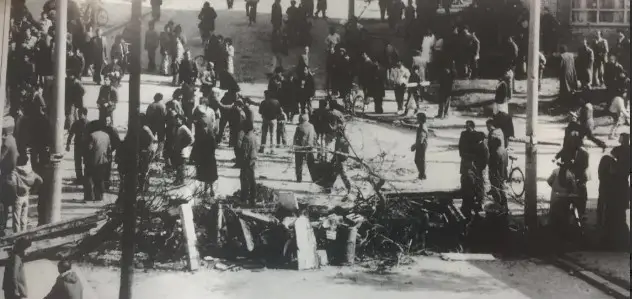
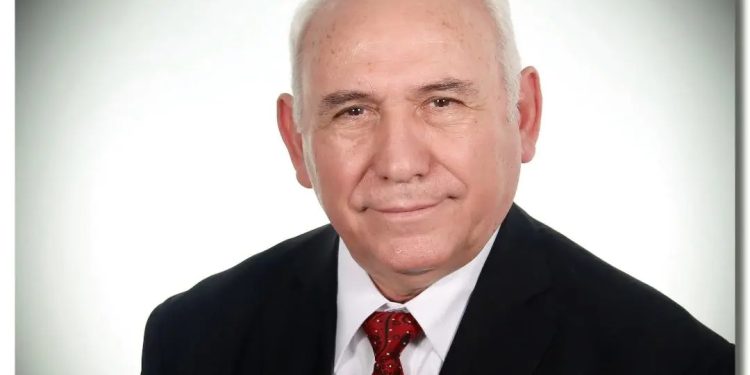
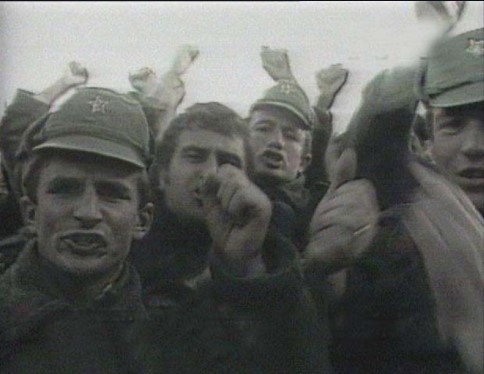
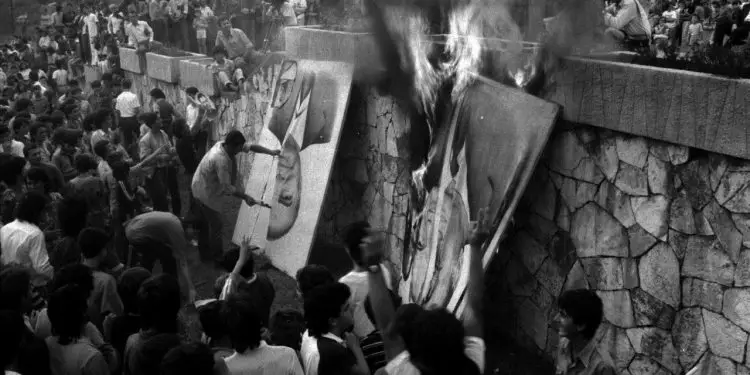
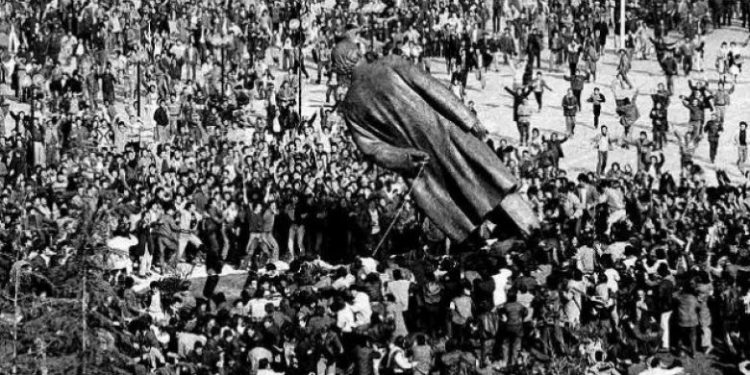

![“When the party secretary told me: ‘Why are you going to the city? Your comrades are harvesting wheat in the [voluntary] action, where the Party and Comrade Enver call them, while you wander about; they are fighting in Vietnam,’ I…”/ Reflections of the writer from Vlora.](https://memorie.al/wp-content/uploads/2025/06/admin-ajax-4-350x250.jpg)


![“The ensemble, led by saxophonist M. Murthi, violinist M. Tare, [with] S. Reka on accordion and piano, [and] saxophonist S. Selmani, were…”/ The unknown history of the “Dajti” orchestra during the communist regime.](https://memorie.al/wp-content/uploads/2026/02/admin-ajax-3-350x250.jpg)
![“In an attempt to rescue one another, 10 workers were poisoned, but besides the brigadier, [another] 6 also died…”/ The secret document of June 11, 1979, is revealed, regarding the deaths of 6 employees at the Metallurgy Plant.](https://memorie.al/wp-content/uploads/2026/02/maxresdefault-350x250.jpg)

